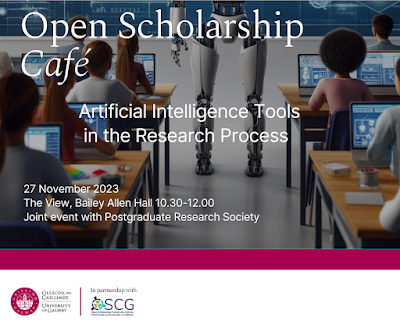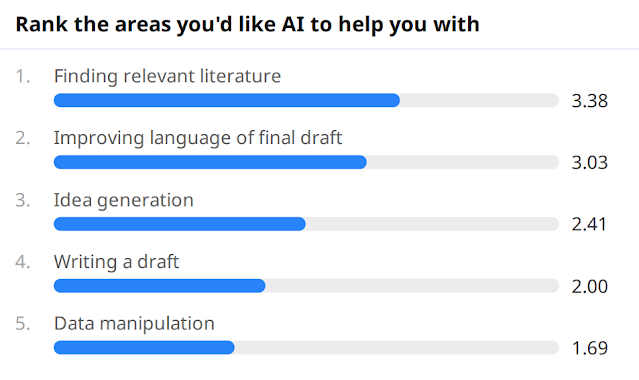Navigating the AI Landscape in Research: Insights from a workshop
Recently, the University of Galway Postgraduate Research Society invited me to conduct a workshop on Artificial Intelligence (AI) tools and their application in the research process. This workshop, primarily attended by PhD students and postdocs, discussed the burgeoning potential of AI in enhancing different parts of the research process and scholarly work.
 |
| Banner for the Open Scholarship Cafe on 27 Nov. 2023 |
This blog summarises mainly the attendees' sentiment towards AI in the research process. Through a series of polls, we gained valuable insights into the priorities, concerns, and experiences of researchers as they contemplate integrating AI tools into their work. These polls revealed a pragmatic view of AI's role in research, from eagerness to enhance literature discovery to cautious optimism about drafting and data manipulation, and highlighted the community's awareness of the ethical dimensions that come with this technology. The results of the polls and the subsequent discussion recognised the potential of AI in the research process while also calling for clearer guidance to navigate its rapid development responsibly.
The polls
We started with the opening question of whether attendees had used an Artificial Intelligence tool before, at this point not differentiating between generative and other forms of AI.
 |
| Poll on AI use |
Nearly half of the attendees had previously utilized an AI tool for research purposes, signalling a trend towards the integration of these technologies in academic workflows. However, a notable 31% had merely experimented with these tools without full-scale implementation, suggesting a cautious approach to adoption.
 |
| Poll on usefulness of AI |
Finally, the ranking of AI assistance needs was asked, with
"Finding relevant literature" leading the poll. This reflects the
ever-growing number of publications that researchers must navigate, emphasizing
the necessity for efficient and intelligent search tools. It also poses interesting questions to libraries in how to respond to this need which is very close to our mission.
Language improvement in final drafts was second priority. Refining syntax and semantics in scholarly writing is often seen as an area ripe for AI intervention, especially as English is not the first language of many researchers working in Ireland.
 |
| Poll on AI assistance needs |
During our discussions on ethical considerations, there was thoughtful concern among attendees. Many indicated they were somewhat apprehensive about the possible misuse or unethical application of AI tools.
 |
| Poll on awareness of problematic use of AI |
This apprehension was largely attributed to the lack of clear institutional guidelines on the use of such technology in research settings. The rapid evolution of AI capabilities, outpacing the development of comprehensive policies and best practices, has also contributed to this unease. The workshop highlighted the pressing need for a structured framework, institutional or disciplinary guidelines, to navigate the ethical dimensions of AI with a focus on responsible usage.
The tools we demoed
Our session included brief demos of AI tools that can assist with various tasks in the research process:
Keenious is an academic search engine designed to assist researchers by recommending relevant research papers. Utilizing artificial intelligence algorithms, it analyses the content of a user's document such as a research paper that you upload to find and suggest research publications, with various filters helping such as years published, citations or Open Access.
Elicit uses AI to find
papers, identify concepts and extract data from PDFs. AI generates a summary of top papers and short abstracts of literature found.
SciSpace is similar to Elicit as an easy way to find, understand, and learn research papers. You can find literature and the add “columns” that use AI to summarise for example abstracts, conclusions or methods. You can easily do that in a number of languages, useful if English is not your first language. You can interrogate papers that you upload into custom libraries.
Perplexity: Perplexity AI is an AI -based conversational search engine that finds information on a broad range of topics. Perplexity sets itself apart by emphasising accuracy and supporting answers with citations from the web.
Google Bard: Google Bard's September 2023 update introduces a suite of enhancements to improve user interaction with generative AI. One use case is to interrogate PDFs you have in your Google Drive to get summaries or comparisons.
There a number of interesting looking tools that I’d like to
test in the near future, especially for analysing and “chat” with a number of
PDFs, such as Powerdrill or docAnalyzer. If you have any feedback on
using such tools please get in touch! You might miss ChatGPT on the list but as most of attendees had some familarity with this tool we focussed on less well known ones.
Highlights from the workshop discussion
The discussion highlighted many issues: ethical, practical, financial… Here are some points we covered:
- Many researchers wonder how to correctly reference the use of AI tools in such as a literature review? Will I get punished or taken less seriously when I use such tools?
- If I use an AI tool how can I make that transparent? You can’t really “cite” text from AI. We concluded that the Acknowledgment section would be the right way to
- Most AI tools use a freemium model where basic and limited tasks are free, however more intense use will require a subscription. Most tools cost between 10-25 Euros per month. Attendees asked whether the university or the library would be able to cover the licence fee and provide access to trusted tools that are cost-free for researchers.
 |
| Lecture hall with researchers as imagined by DALL-E |
Not surprisingly, we were unable to solve many of the issues discussed. The discussions, demonstrations, and feedback from the attendees underscored the vast potential of AI tools in enhancing research processes, from literature discovery to data analysis. Yet, they also highlighted significant concerns around ethics, transparency, and the practicalities of integrating these tools into scholarly work. It is clear that this is the start of a long AI journey!
Acknowledgements: The final version of this blog post has been
assisted by the AI tool Paperpal which
helped with spelling and wording. The polling software used was Slido.
This blog post was written by Hardy Schwamm, Open Scholarship Librarian at the University of Galway.
Comments